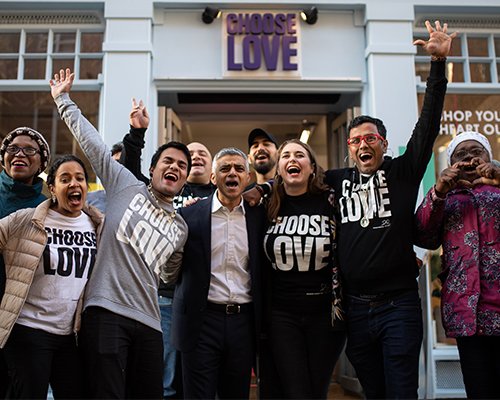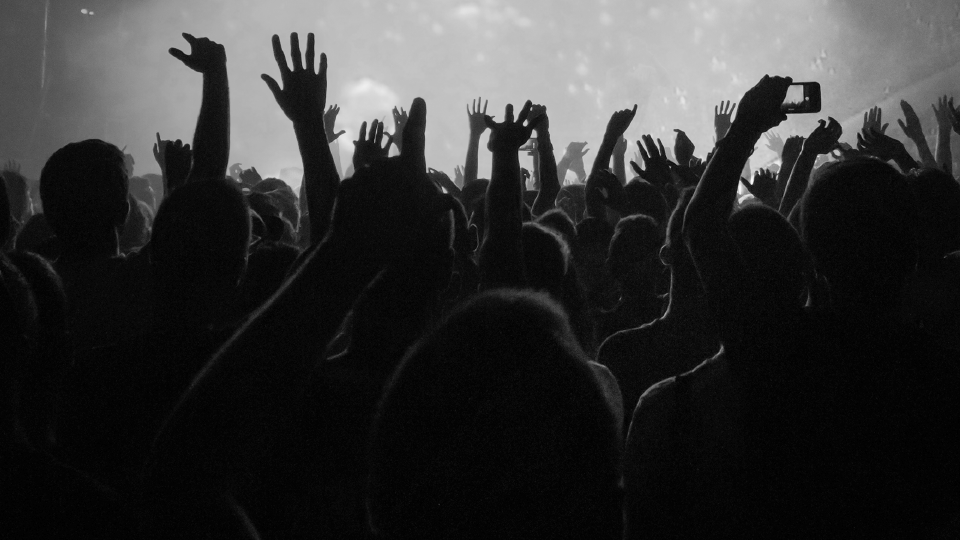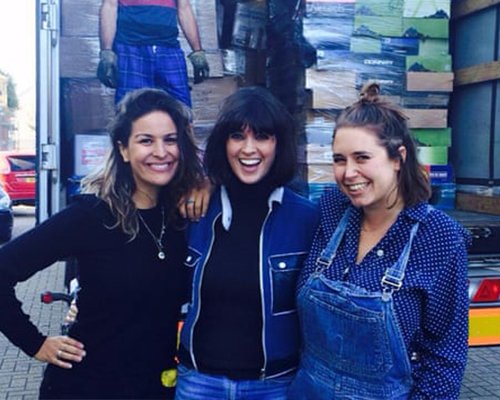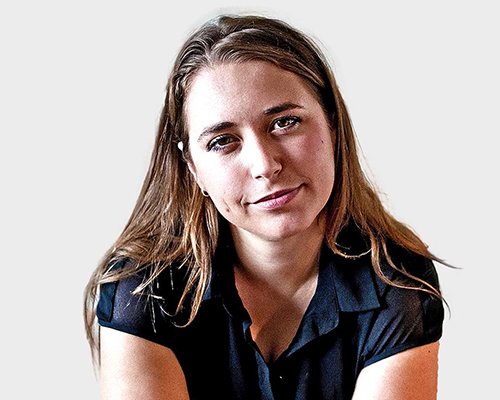Choose Love has never been about one person.
Formerly known as Help Refugees, it’s a charity that unites people with compassion: volunteers, staff, fundraisers, celebrities, grassroots activists.
Since its founding in 2015 in response to the crisis in the Calais “jungle”, the camp that was home to 10,000 refugees at its peak, Choose Love has helped more than 1 million people across 15 countries. They’re currently working with 164 partners in 17 countries.
But if you really had to, you could pinpoint one woman right at its centre since the very beginning. Though she would loathe to take the credit — 36-year-old Josie Naughton, Choose Love’s CEO and co-founder, would much rather talk about the movement itself.
The story behind Choose Love is well-publicised: Naughton and her friends were horrified by the news stories of squalid conditions in the informal refugee camps in Calais, France. They set up a hashtag on social media, and after having raised £1,000, their fundraising rapidly grew to £56,000.
Thousands of packages of aid started arriving every day — sleeping bags, tents, food. But when they got to Calais in August 2015, they were shocked to discover that there was no international charity coordinating efforts. So they got themselves a warehouse, recruited a network of volunteers on Facebook, and Help Calais was born: Choose Love’s first incarnation.
Overnight, Choose Love say, they became the largest aid operation in northern France.
"We can all do something." ✊
— Global Citizen UK (@GlblCtznUK) July 16, 2021
We spoke to @ChooseLove co-founder Josie Naughton about her inspirational work fighting the refugee crisis, how she persists with hope, and where her activism first began.
Watch the video — and read more about her story: https://t.co/4vAbglU3gCpic.twitter.com/LmNWeHMtN0
When the organization started, volunteers juggled full-time jobs by working long into the night. Now, although the work never stops, they’re trying to find a new balance — very much a “work-in-progress”, Naughton tells Global Citizen.
A lot has changed since 2015. The UK has abandoned legislation that protected the rights of unaccompanied child refugees to reunite with family in Britain — and are reportedly planning an offshore processing centre to hold asylum seekers in Rwanda. Amid a global crisis of inattention, a devastating fire destroyed what was Europe’s largest refugee camp on the Greek island of Lesbos in September 2020.
For Naughton, therapy has been a “real godsend”. She’s still coming to terms with the “uncomfortable reality” that despite the ever-present risk of burnout, their work always leads to a warm bed at the end of every long day. The same can’t be said of the people they seek to help.

First up: if you had a time machine, and met 2015 Josie, what would you say to her?
Oh that’s not something I’ve ever thought about before!
I would say: believe in yourself, you can do this, and don’t underestimate how much individuals can do, what small groups of people can do, what extraordinary things ordinary people can do. There will be really hard moments when it feels like everything is impossible and it’s all going to collapse around you. But it’s going to be OK.
Always ask for help — and there are so many incredible, amazing people who will be on this road, on this journey that you will meet and will be just a total privilege to do the work.
When you were a kid, I read somewhere that you wanted to work for the United Nations. I’m not sure I’d even heard of the UN until I was a teenager — where did that come from?
I had a really amazing religious and philosophy teacher called Mrs. Grill, who really tried to instill activism in her students. She used to get us to write Amnesty letters and stuff, and I just loved her.
I think it came from her. That was definitely what I wanted to do with my life — but my life had other plans for me. I ended up dropping out of university and working in a bar in Camden, and not really knowing what I was going to do … It’s funny how life turns out, because actually all the connections I made led to me working in music, and that led to being able to start Choose Love in the way that we did.

That’s so cool. Have you spoken to your teacher since you started Choose Love?
I actually bumped into her about two years ago, and ran over and said what I was doing now, and that it wouldn’t be without her.
I think she was like: “who is this mad person?”
Before Choose Love, you worked in the music industry. How did that shape you as a person — and how did it give you the launchpad you needed to lead an international NGO?
I just was so privileged to get to see so many incredible individuals, all creating such magic in the world. I got an inside-look at touring, the creative behind an album, behind music videos. And then I would just say the work ethic everyone had was just incredible, and I never once in my time there saw anyone ever get angry, ever not be patient.
Everyone was so kind. At the top of the game, everyone was just the kindest, nicest person ever — and I saw how far that gets you. A lot of those values have really helped.
And then things like, had I not known how lucrative merch[andise] is, and how important a part that is in touring, for example, I wouldn’t have been like: “we have to sell a t-shirt!”. That led to everything, actually.
This #WorldRefugeeDay, join us in signing the @ChooseLove manifesto — and you could earn one of their iconic t-shirts! ✨
— Global Citizen UK (@GlblCtznUK) June 20, 2021
Take action: https://t.co/RMUW214Yta
Earn t-shirt: https://t.co/vkiBnr4BxVpic.twitter.com/6psRnZujMW
You have so many celebrity supporters: Harry Styles, Dua Lipa, Olivia Colman, Jude Law, Michael Caine, Jameela Jamil, Chris O'Dowd, to name but a few. How do you talk to someone like Harry Styles about the refugee crisis?
The same as how you talk about it to anyone I think.
Half of the organisations we fund are led by those with lived experience of forced displacement, and in those opportune moments where we’re able to have these conversations with these big stars and influential people, if we’re not able to have those themselves that have been through it in that conversation, then we want to just amplify all the conversations we’ve had in our journey of being on the ground.
We’d say that right now there are 5,000 children living in this camp and they aren’t in school and there’s no access to water, and there's little access to nutritious food, and it’s about to snow. We work with amazing partners who can do education, who can distribute bananas, who can winterise the tents, who will give the kids coats, and they’re there right now — we can make that impact happen right now.
We can all do something.
How far did the viral photograph of Alan Kurdi — the 3-year-old Syrian refugee who drowned during an attempted crossing from Turkey to Greece — motivate why you founded Choose Love?
We started our Crowdfunder on a Saturday, and within a week of that Alan Kurdi lost his life and that photo went viral. I do believe that’s why so many people were so moved, and they then discovered us and donated to us. I don’t think if that had not happened that our organisation would exist in the way that it does.
That photo still is just so heartbreaking. He’s the symbol of what happened to so, so, so many people there — that is still happening now, but it doesn’t get front page media attention. You look at that photo, and you look at his little shoes, and it’s just not right that that happens.
We talk of this being a humanitarian crisis, but it’s not a humanitarian crisis. This is a man-made, political crisis. That’s just really unacceptable. I think in that moment there was a spark of compassion in people and civil society. There were a lot of organisations started in 2015.
How do you feel about the response from political leaders?
If there’s political will, there’s a way, and it just doesn’t feel like there’s political will. Leadership has got very desensitised to what’s happening, and it’s become normal. When we approach the media about situations now, it's not news anymore. It’s become normalised that kids are drowning or that people are living in these camps, and have been living in them year-on-year, or that concrete walls are being built around them.
It’s very frustrating. No solutions seem to be being proposed … It’s never thinking about the individuals, it’s just thinking about securitisation of borders, and protecting borders rather than people. I really wish that at the levels this needs to come from that there were much more productive, compassionate conversations that were happening.
The pandemic has had some pretty devastating consequences for the world’s refugees. What new challenges have you faced in the last year?
There’s a feeling of helplessness of not being able to make that difference that we know needs to happen on the ground. We’ve been doing this for six years now, and not really seeing it get better, but if anything seeing it get worse and harder. That’s quite difficult.
But it’s a privilege to do this. We feel really lucky to do this work, and are inspired by the people we get to work with. It’s always a mixed bag.
How has the current conversation surrounding refugees coming to the UK — especially from Calais — impacted you? Do you still have hope?
I always do have hope.
But I do think that there needs to be a kind of rethink around the strategy of how communication is happening. We live in this polarised society and this polarised space online and it’s something we feel really aware of: we have to be able to have conversations.
We so venomously disagree with so much of this rhetoric, and these actions, and these policies, but we have to find a way to have conversations because that’s in the best interest of the individuals who are caught up in this. I think there needs to be a stronger working together of organisations of people working towards a more just world. There’s so many voices, and everyone isn’t necessarily singing from the same songsheet.
It’s always a fine line to walk between speaking the truth, calling things out, but also being effective. We’re trying to navigate that and work with as many people and organisations as we can to do that.
What does being a Global Citizen mean to you?
Being a Global Citizen means doing your part, doing your best, and for everyone that means something different. It’s about having that sense of responsibility that we should all have to build the world that we want to see — and acting that every day.

Global Citizen has partnered with Choose Love to demand that the UK urgently builds a fair, efficient asylum process, rooted in protection and dignity. A kinder, more human response is possible. Take action and sign the Choose Welcome manifesto here — and you could earn an iconic Choose Love t-shirt.



